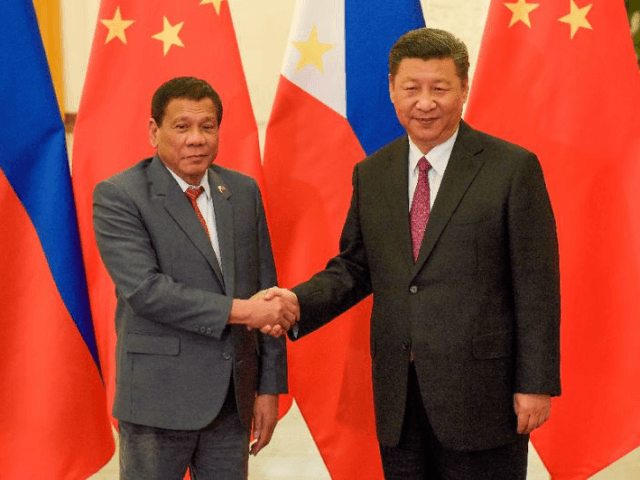The current era of heightened tension in the South China Sea began with a 2016 ruling in favor of the Philippines over China’s expansive territorial claims.
China ignored the ruling and told the rest of the world to do likewise. The Philippines have been slowly backing away from their claims ever since. On Monday, the foreign ministers of China and the Philippines declared their support for “peace and stability” in the South China Sea, largely along Beijing’s terms.
Chinese Foreign Minister Wang Yi spoke during a visit to the Philippines on Monday and said the situation in the South China Sea is growing more stable as China’s territorial claims are recognized.
“Countries concerned have returned to the track of dialogue and negotiations and consultations to properly handle the differences, together with the Association of Southeast Asian Nations (ASEAN) countries, China and these countries are jointly upholding peace and stability in the South China Sea,” Wang said.
“China is ready to enhance cooperation with the Philippines and other coastal countries along the South China Sea, strengthen cooperation on environmental protection, scientific research, fishery and search and rescue, so as to enhance trust and deliver more benefit to the peoples of the countries. China is also ready to further discuss with the Philippines about joint development of oil and natural gas in the South China Sea,” he added.
Wang took a moment to warn certain unnamed “non-regional countries” from intervening to thwart Beijing’s plans to establish new “regional norms.”
“Regional countries need to keep high vigilance against these. We must further enhance our solidarity and work together to make the South China Sea a sea of peace, friendship, and cooperation. By this we will not leave any chance to be exploited by any external forces,” he said.
The latter point is crucial because the Philippines have long objected to China’s plan for effectively annexing oil and gas fields in the West Philippine Sea. The most pessimistic observers in the Philippines saw Wang’s visit as a victory lap, the culmination of a two-year push to overturn the Hague decision in favor of Manila.
“Who will get the lion’s share of the profits, and whose rules will prevail?” an article at Rappler asked on Monday. “Experts view joint exploration as a way for China to redeem itself after losing the South China Sea case filed by the Philippines at The Hague. What China failed to win in court, will it now win through joint exploration?”
The more optimistic view, as advanced by officials such as Philippine Energy Secretary Alfonso Cusi, is that profitable joint exploration can begin after a ban on exploration in contested waters imposed by the previous Philippine administration is lifted. A deal along these lines is expected when Chinese Communist Party leader Xi Jinping visits the Philippines in November. Philippine officials are eager to develop oil resources in the South China Sea region, even if it requires a junior partnership with China, because high fuel prices are seen as a major drag on the Philippine economy at a time when food prices are rising as well.
“Any deal on joint exploration would mark a major win for China, which has stepped up efforts over the past decade to block Southeast Asian nations from extracting energy resources in disputed seas. The Philippines had previously aligned with Vietnam in rejecting China’s claims to most of the South China Sea as a basis for joint exploration,” WorldOil observed on Tuesday.
Wang pledged “firm support” for the Philippines through China’s Belt and Road infrastructure project, which will pour Chinese money into Philippine development projects, and signaled President Rodrigo Duterte that he will never hear a Western-style lecture on human rights from Beijing.
“President Duterte has launched fights against illicit drugs and terrorism. This is a just cause which is conducive to providing a tranquil environment for the economy and peoples’ lives,” said Wang, referring to a bloody drug war that has prompted much international criticism of Duterte’s methods.
“China is continuing to provide support in terms of assistance in intelligence sharing and capacity building. We are going to speak up for the just causes of the Philippines in the United Nations, UN human rights organizations and other multinational occasions,” he promised.

COMMENTS
Please let us know if you're having issues with commenting.